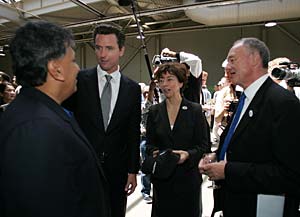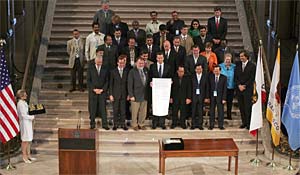Greening the Cities
Air Date: Week of June 10, 2005

San Francisco Mayor Gavin Newsom holds the Urban Environmental Accords which was signed by 50 mayors. (Photo: Andy Kuno/WED2005)
Mayors from cities around the globe signed a document with an ambitious set of goals designed to make their cities greener. The Urban Environmental Accords sets out twenty-one actions in areas ranging from energy to transportation to environmental health and mayors will work over the next seven years to implement the objectives. The Accords signing was the culmination of the World Environment Day Conference. Living on Earth’s Eileen Bolinsky reports.
Transcript
CURWOOD: From the Jennifer and Ted Stanley Studios in Somerville, Massachusetts, this is Living on Earth. I’m Steve Curwood. The green carpet was recently rolled out at City Hall in San Francisco. Inside, fifty mayors from around the world signed on to Urban Environmental Accords, a set of 21 actions designed to promote greener cities.
ANNOUNCER: Ahmedabad, Arnhem, and Austin…please come up to the podium.
[APPLAUSE]
CURWOOD: It was the final event of World Environment Day, sponsored by the United Nations. Living on Earth’s Eileen Bolinsky has our story.
BOLINSKY: United Nations documents are typically agreements between countries, but these Urban Environmental Accords stand out as an agreement among international cities. U.N. Environment Program Director Klaus Toepfer noted that the majority of people now live in urban areas, and if we are looking at the future of the planet, it is urgent that city mayors take action.
TOEPFER: We have to have this exchange what we call let’s be aware of the ecological footprints of cities so we can step by step reduce them and cooperate. We are exporting waste, we are exporting sewage, we are exporting polluted air. And we have to import water, we have to import clean air.
|
|
BOLINSKY: As host city of the five day World Environment Day conference, San Francisco offered mayors, government officials, and members of advocacy groups a daily forum to share information, experiences, and a plan to move forward toward making their cities greener. [MEETING AMBIENCE FADES IN] BOLINSKY: At these so-called World Café sessions, attendees were divided into small working groups and given a number of assignments designed to inspire global dialogue. KENOLI: Our first exercise today is going to be to talk about the things that you have already done…particularly the things you are proud of. CADMAN: I think the thing we’re most proud of is actually having done a 100 year plan for the city. BOLINSKY: David Cadman is Vancouver’s deputy mayor. CADMAN: When we did a 100 year plan we learned that we run out of water in 35 years, run out of oil in 40 years, run out of natural gas in 60 years so we can’t plan tomorrow as if it’s a continuum of today. LUTTERAL: Very little to be proud of. We have done very little to protect one of our most important resources and that’s our riverfront that we have. BOLINSKY: Juan Martin Lutteral works on water issues in Buenos Aires, Argentina. LUTTERAL: I don’t know if you know it but Buenos Aires is on the verge of the widest river in the world and the free land that we have there is still in struggle with the lack of vision about the importance of protecting those open spaces for the generations to come. BOLINSKY: At another table, delegates Dana Smirin of South Africa, Mayor Hilmy Mohamed of Matale, Sri Lanka and Diego Diez Martin of Caracas, Venezuela spoke of their cities’ priorities. SMIRIN: For me, mine was food security and water. So that every family has healthy food and clean water. MOHAMED: My city has 27 natural spouts, you know, so wish, my dream is to get, you know, like some water parks going in the city to attract tourism to them. MARTIN: Caracas is a big city. And one of the things that people is that people are thinking about is waste management and I would like to see the streets really clean with no waste problems. BOLINSKY: Dr. Adedeji works on waste reduction in Lagos, Nigeria. He says there are no quick fixes to reducing waste sustainably. ADEDEJI: Not too many countries in the world that are developing have a protocol for waste management yet. Even for those who have, it is a seeming problem that never will have an end because population growth is a factor that you must reckon with. As long as population is growing, the amount of waste that is generated on a daily basis grows with it. And, therefore, if you have a solution for the quantity that you’re handling today, in another one year you have to start looking for another solution. BOLINSKY: Residents of Lagos recently began sorting their trash in color-coded bags and small business owners will soon be paid for recycling plastics. ADEDEJI: So, at this point, what we’re trying to do is to put together a waste management practice that addresses the culture of the people. And also inform the way and manner that people are going to relate to the waste they generate. And I think that is the key.
|







